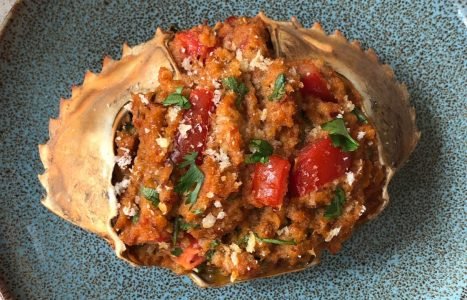Nutrition
Akotonshi (Stuffed crab)

Akotonshi
Akotonshi is a delicious stuffed crab dish that is associated with feasting in Ghana.
The dish is sprinkled with breadcrumbs and placed under a broiler. When served, akotonshi is usually garnished with chopped parsley.
Ingredients
5 large whole crabs or cooked crabbed meat
2 large fresh ginger
3 tablespoonfuls of cooking oil
2 large onion minced
1 tablespoonful of ginger ground
2 large tomatoes finely chopped
1 tablespoonful of tomato paste
1 large green bell peppers finely chopped
1 tablespoonful of ground nut meg
1 tablespoonful of cloves ground
1 tablespoonful of dried thyme leaves
1/2 cup of dried shrimp
1 cup of plain bread crumbs
2 tablespoonfuls of salt
Preparation
-When cooking crabs, clean them and bring a large pot of water to a boil.
-Add in the ginger, cloves and the crab, cook for 15 minutes. Remove crabs and meat, keep shells for plating.
-If using just crab meat mix crab meat with ¼ cup water that has been boiled with the ginger piece and cloves for 15 minutes. Drain water, flake the meat and set aside.
-In a heavy pot, heat oil to medium temperature and add other ingredients in the following sequence, stirring for a minute or so between each: onions, ground ginger, tomatoes, tomato paste, green pepper, cumin, nutmeg, thyme, grains of paradise, paprika, mashed peppers, and dried shrimp.
-Reduce heat and simmer for 4-5 minutes, stirring constantly, until vegetables are cooked.
-Add crab meat and stir another couple of minutes to heat it through. Then spoon the mixture into clean crab shells or ramekins (small individual baking dishes).
-Sprinkle breadcrumbs on top of each crab and toast under an oven broiler, being careful not to let the crumbs scorch. —Source: Pulse.gh
Nutrition
The NHIS Opportunity: Leveraging Ghana’s uncapped health levy for nutrition services
Ghana’s decision to uncap the National Health Insurance Levy in 2025 marks an important shift in health financing. By removing limits on how much revenue the National Health Insurance Scheme (NHIS) can receive, government has created room to strengthen and expand essential health services.
This change comes at a crucial time for maternal and child nutrition, where effective solutions already exist but are yet to reach everyone who needs them.
Two such interventions are Ready-to-Use Therapeutic Food (RUTF) for children with severe acute malnutrition and Multiple Micronutrient Supplements (MMS) for pregnant women. Both are included in Ghana’s Essential Medicines List and Standard Treatment Guidelines, confirming their safety and effectiveness. Yet neither is currently covered under NHIS, leaving access dependent largely on donor-supported programmes.
The consequences are visible. An estimated 68,517 children in Ghana need treatment for severe acute malnutrition, but only about 15 per cent receive RUTF. For pregnant women, iron–folic acid supplements remain the standard, even though they address only two of the 15 essential micronutrients required during pregnancy. As a result, maternal anaemia remains widespread, affecting between 37 and 63 per cent of pregnant women depending on the trimester.
What makes this moment different is that Ghana already has the systems needed to deliver these services at scale. NHIS enrollment among mothers of children under five stands at about 84 per cent. National guidelines for the use of RUTF and MMS are finalised and in use, and more than 600 health workers have been trained on updated protocols. Supply chain structures are in place. The missing link has been sustainable, predictable financing.
Cost should not be a barrier. A full course of MMS costs about USD 2.50 per pregnancy and has been shown to reduce low birth weight by 12 per cent and preterm births by 11 per cent. This represents a small share of current spending on undernutrition. RUTF, while more resource-intensive, reduces the need for expensive hospital admissions by enabling effective community-based care, with recovery rates of 75 to 90 per cent. Ongoing Health Technology Assessments will provide Ghana-specific evidence to guide NHIS reimbursement decisions.
Including RUTF and MMS in the NHIS benefits package would change how nutrition services are delivered. Coverage would no longer depend on where donor programmes operate. Families would be protected from out-of-pocket costs, and services would be delivered as part of routine maternal and child healthcare. Importantly, data on coverage and outcomes would flow through national systems, strengthening monitoring, accountability, and planning.
Ghana has committed to achieving 80 per cent coverage of essential health services by 2030 under its Universal Health Coverage agenda. Nutrition is central to this goal, as it underpins child survival, maternal health, and long-term human development. The uncapping of the National Health Insurance Levy offers a rare chance to close long-standing nutrition financing gaps using domestic resources.
The opportunity is clear. The systems are ready. The evidence is established. What remains is a deliberate policy choice to use this expanded fiscal space to ensure that lifesaving nutrition services reach mothers and children across the country, consistently, equitably, and sustainably. The levy uncapping opens the door; leadership must walk through it.
Feature article by Women, Media and Change under its Nourish Ghana: Advocating for Increased Leadership to Combat Malnutrition project
Join our WhatsApp Channel now!
https://whatsapp.com/channel/0029VbBElzjInlqHhl1aTU27
Nutrition
Benefits of chocolate

Chocolate is made from tropical Theobroma cacao tree seeds. It has since become a popular food product that millions enjoy every day. It has a unique, rich, and sweet taste.
-Cholesterol
A researcher revealed that chocolate consumption help to reduce low density lipoprotein.
Regular consumption of chocolate bars with low-fat diet supports cardiovascular health by lowering cholesterol and improves blood pressure.
- Keeps brain healthy
Researchers have suggested that drinking two cups of hot chocolate a day could keep the brain healthy and reduce memory decline in older people.
The researchers found that hot chocolate helped improve blood flow to parts of the brain where it was needed.
- Heart disease
Consuming chocolate could help lower the risk of developing heart disease and also lower risk of cardiometabolic disorders.
-Stroke
Canadian scientists, in a study involving 44,489 individuals, found that people who ate one chocolate were 22 per cent less likely to experience a stroke than those who did not.
Also, those who had about two ounces of chocolate a week were 46 per cent less likely to die from a stroke.
-Fetal growth and development
Eating chocolate every day during pregnancy might benefit fetal growth and development, according to a study presented at the 2016 Pregnancy Meeting of the Society for Maternal-Fetal Medicine in Atlanta, GA.
The flavonoids in dark chocolate can stimulate the endothelium (lining of arteries) to produce nitric oxide (NO).
One of the functions of nitric oxide is to send signals to the arteries to relax, which lowers the resistance to blood flow and therefore reduces blood pressure.
Dark chocolate may also improve the function of your brain.
Studies show that eating high flavanol cocoa could help improve blood flow to the brain in young adults.
Cocoa flavonoids may also help maintain brain health and the ability to think in older adults with mild cognitive impairment and reduce the chance of progressing to dementia. But more research is needed.
-medicalnewstoday.com







